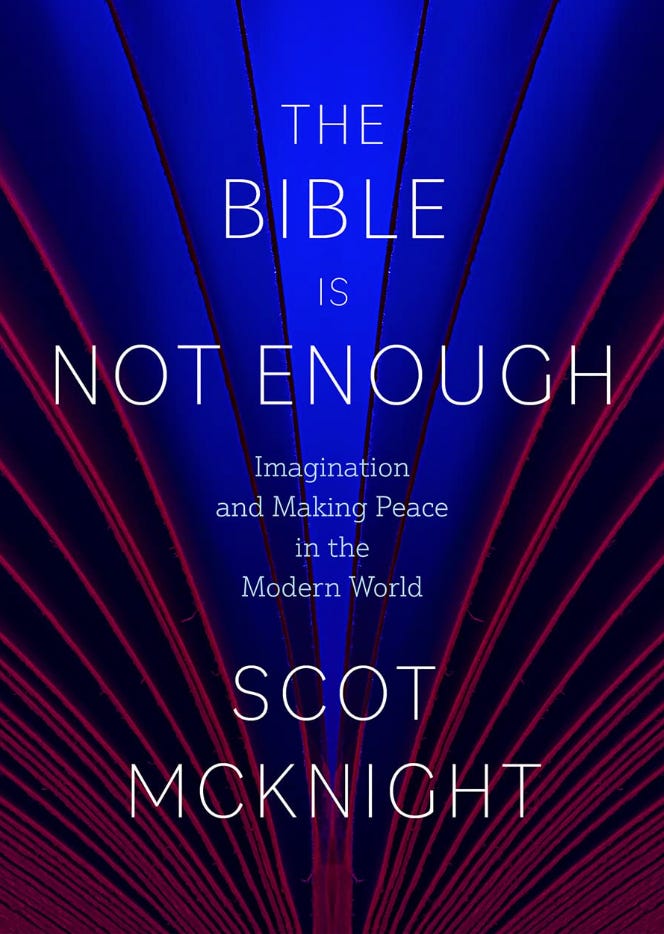Peace is Our Prophetic Burden
An excerpt from my new book, The Bible Is Not Enough: Imagination and Making Peace in the Modern World (Minneapolis: Fortress, 2023).
A sketch of the meaning of the term peace in the New Testament reveals that God is a God of peace, the message is a gospel of peace, the gospel makes peace with God, and thus believers are to pursue peace among themselves and with others. Paul greets his churches with peace and Paul reminds the Corinthians—with whom he had at least a strained relationship— that the Christian calling is to live in peace. One of the most important visions of the early Christians is found in Ephesians 2, when Paul says Christ is himself the peace that unites gentiles with Jews. That theme expands to cosmic peace in another letter of Paul’s, the one to the Colossians.
Peace needs to be pressed into action because war and peace cannot themselves be the simultaneous callings of those who follow the way of Jesus. One can’t mitigate peace with war and contend for following the teachings of the New Testament. Peace is not a preference for Christians. Peace is the necessity, the prophetic burden. War must turn from inevitable to the intolerable. The idealistic arc of the universe toward justice will never curve downward without the protestations of those who see through the rhetoric to the reality. Politicians won’t bend the arc.
The deepest blame for the perpetuation of endless war fell on Obama himself. He established a working relationship with a public that allowed itself to be convinced that his policies of endless and humane war, though not exactly what they had signed up for, were morally wholesome. This effect depended utterly on Obama’s rhetorical genius.
Samuel Moyn, Humane: How the United States Abandoned Peace and Reinvented War (New York: Farrar, Straus and Giroux, 2021), 306.
Let it be said for those who want to point to the other side in Congress that finger pointing is entirely accurate. Obama carried on what was there, and none can claim surprise that Trump escalated it. Trump “left no doubt about his opinion of humane war. Trump’s statements involved worse than callous disregard for suffering in conflict; he actively praised brutality.” Trump believed “torture works,” and he was a fan of the $64 million Reaper drone. The solution can’t be found on either side of Congress. The history of our politics devolves to where we are, and it fails to aspire to where we need to be. The so-called Christian America tells a story of the history of war because of the poverty of imagination.
There is an option. Dissidents resisting the crime of war can choose to improvise a peaceful imagination. Such improvisation can be imagined because of the Bible’s peace vision, but a peaceful imagination must go beyond the Bible. Such a practice requires an imagination that roots itself in the Bible but improvises a peace vision to a kingdom end. The goal is not a new social policy to replace or augment old ones, but a destabilizing of current policies and their replacement with a peaceful imagination.
Most people label a peaceful imagination as “pacifist,” as if that was a weak or dirty word. But one must clarify immediately that pacifism does not mean pacifistic or inactive. Rather, a peaceful imagination is active in nonviolent resistance. There is no need to apologize for the term pacifism or to defend the view that it is activist, nonviolent resistance. The so-called temple tantrum of Jesus proves a peaceful imagination can be improvised in nonviolent disruption. A peaceful imagination is social disruption.
For more Substacks like this, please…




I married into a Mennonite family, having been raised Baptist/Methodist, and that was the first time I encountered a theological understanding of peace that impacts how you live in the world. I have been changed by my association with Anabaptist thinking.
I am so excited to read this! As someone who regards highly the authority of Scripture and ministers in that context, the title is provocative. Knowing this is also a value of yours, I am curious, of all the title possibilities, how and why you chose this? I do believe as disciples Scripture is not the only component of our discipleship. And I appreciate the call to becoming creative.